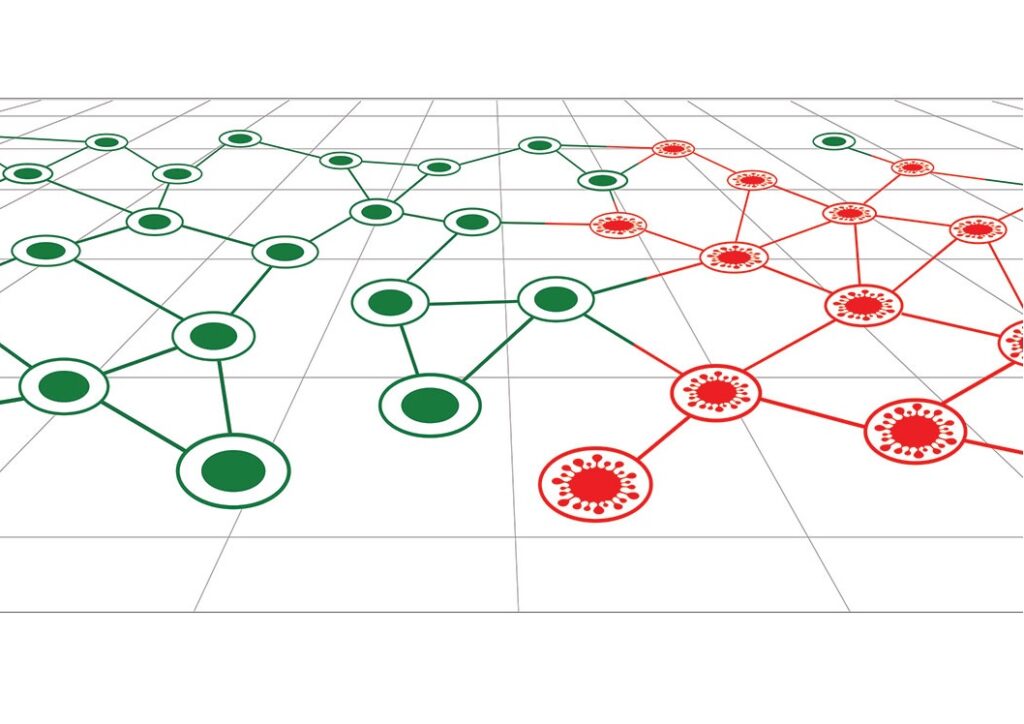
 On the fence about using your local contact tracing app? We don’t blame you. Judging by the news, governments and app developers could have handled things better. See the worldwide state of contact tracing apps if you’re unsure how well the local solution protects your privacy. Otherwise, read on for the merits and criticisms of this new tech.
On the fence about using your local contact tracing app? We don’t blame you. Judging by the news, governments and app developers could have handled things better. See the worldwide state of contact tracing apps if you’re unsure how well the local solution protects your privacy. Otherwise, read on for the merits and criticisms of this new tech.
Fortunately, not everything is a negative when it comes to digital contact tracing. Let’s start on a positive note and see the good these apps can do.
The Pros
1. Some success in breaking chains of infection
Scientists haven’t given up on contact tracing apps, despite being skeptical of their overall effectiveness. Countries like South Korea have shown that this technology may be effective at containing the virus – albeit at the cost of user privacy, as we’ll see in the cons section.
Germany and Ireland have some of the highest app adoption rates in the world, although it’s still not enough to be fully effective. Nevertheless, spokespeople say that every life saved as a result of using a contact tracing app is a success in their book.
2. Faster means of alerting people
Exposure notifications are delivered more effectively if the process is automatic. It makes sense – rather than having to call each person individually, an app may alert everyone that’s been in close proximity to an infected person. Provided each party uses the app, that is.
It’s also better than relying solely on people’s memory of where they’ve been and who they came in contact with. Naturally, digital contact tracing and doing things “the old fashioned way” aren’t mutually exclusive. Not everyone will have the app installed on their phone – or even own a smartphone, for that matter.
As such, health organizations still have to rely on old techniques to prevent further outbreaks. At the very least, the apps have somewhat eased the job of on-the-field contact tracers (see South Korea’s Immediate Response Teams).
3. Peace of mind
During times of turmoil, anything that can offer some solace is a welcome sight. Knowing that there are millions of people out there who are doing something to stop the spread of Covid-19 can be a calming thought. Obviously, people shouldn’t let contact tracing apps become psychological crutches. Nor should it deter them from following basic anti-Covid measures like wearing a mask in public.
The Cons
1. Privacy issues
As mentioned before, South Korea was one of the biggest successes for digital contact tracing. At the same time, it was one of the worst offenders on the privacy front (short of China and similar iron-fisted approaches). You can get a good idea about the app’s intrusiveness from the fact that it managed to expose cheating partners, among other embarrassing details about infected people’s lives.
Of course, South Korea’s app is built with location tracking in mind. Less privacy-invasive solutions exist, such as those that use Bluetooth or ultrasonic technology.
Now, disagreements exist even among Bluetooth proponents, mostly regarding the centralisation vs. decentralisation of data. For the most part, though, academics agree that moving away from location-based contact tracing apps is essential for user privacy.
2. Security flaws
Months after the start of the pandemic, many contact tracing apps are still a work in progress. The reason? Many governments and app developers rushed out their solutions in a move some call “do-something-itis.”
A previous version of the UK NHS’s app which was rife with security issues was abandoned in favor of a new one based on the framework built by Google and Apple. A framework that isn’t as airtight as the two tech giants initially claimed, it seems. At least these issues are being patched out as they’re discovered. App users are advised to keep everything up-to-date, to avoid any unpleasant surprises.
3. Exclusionary
Another problem with keeping things digital is that not everybody has the means of using the apps. China’s Alipay Health Code app has sparked debate on social media due to a video of a senior citizen losing his cool for being unable to show his QR code.
If you aren’t familiar, China’s app uses a QR color-coding system to provide access to public services. Only green code users benefit from relative freedom of movement, while yellow and red users face restrictions and isolation orders.
Elsewhere, in India, people from poor areas can’t even afford smartphones to run Aarogya Setu. The government-produced app was initially mandatory for everyone. After weeks of public backlash, it was eventually decided that only employees and containment zone inhabitants would need to use the app. The app’s status has been pretty volatile, so conflicting reports may exist.
In the end – and despite some scattered successes – the public view of digital contact tracing isn’t too rosy. Concerns that apps may be used for mass surveillance after the pandemic aren’t helping their case, either.

Richard Ernszt
ProPrivacy.com


